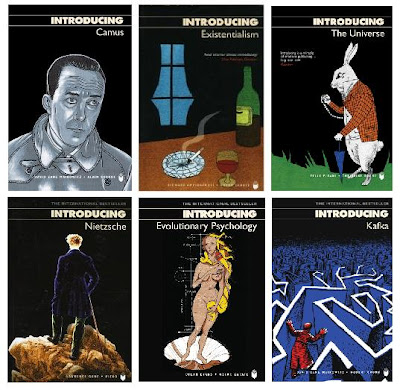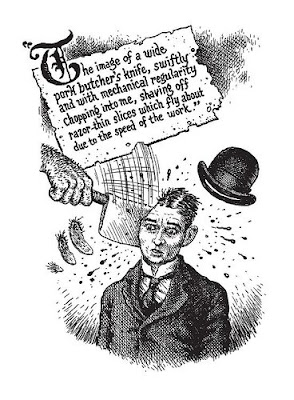I'm currently reading
Introducing Hegel
, from the Totem Books
Introducing series (published by Icon Books in the UK, older editions sometimes have the alternative title "for Beginners"). These books offer concise illustrated guides to key figures and concepts in science and the humanities. Some are almost written like graphic novels, while other are more focused on the text, with the illustrations as a mere visual reprieve. As far as I know, and according to the publisher's website, this series is the first one to utilize this format, with other less successful attempts, like the
Writers & Readers "For Beginners" series, copying their format almost exactly, though far less successfully (Writers and Readers is about to release
Barack Obama for Beginners
, which seems a bit premature to me).

The current format of the Totem Books Introducing series has attractively stylized black covers, which I think are far nicer than the original printings with their cartoonish drawings and yellow logo. Twelve titles are now being reprinted in a brand-new, pocket-sized format, with far less original and interesting covers, which I hope won't become the standard from now on.

As for the content, it naturally varies by writer and artist. Usually, the books dealing with people are better than the ones dealing with theories and concepts, which often betray the writer's own theoretical slant. The most successful book in the series, and my personal favorite, is
Introducing Kafka
, written by David Zane Mairowitz and illustrated by Robert Crumb. It includes comic adaptations of some of Kafka's most famous short works (Metamorphosis, A Hunger Artist, In the Penal Colony, and The Judgment) as well as brief sketches of his three novels. The popularity of Crumb's unique rendition of Kafka's works led to additional printings under the title
R. Crumb's Kafka
, which I think is a little unfair since Mairowitz did a great job on the book as well. (The latest edition, published by Fanatagraphics Books and named simply
Kafka
, gives Mairowitz equal credit, though his name is listed after Crumb's.)
 from Introducing Kafka
Introducing Camus
from Introducing Kafka
Introducing Camus
, also by Mairowitz, is quite good, as are the books dedicated to
Friedrich Nietzsche
,
Zigmund Freud
,
Roland Barthes
,
Jean-Paul Sartre
,
Walter Benjamin
,
Carl Jung
, and the
Marquis De Sade
, which offer a good combination of brief biography and general overview of their major works and ideas.
Introducing Joyce
is particularly successful in giving readers an idea of what the Irish writer was trying to accomplish in his work, as well as encouraging them to explore more of his work. The books on
Shakespeare
and
Picasso
are less successful, the former getting lost in the biography without saying much about the works, and the latter focusing too much on deconstructing the myth of the genius artist.
 from Introducing Joyce
from Introducing Joyce
I found that the books dedicated to concepts are usually better when dealing with subjects I know nothing about, which I guess is exactly the way it should be; I shouldn't criticize an introductory book on a topic I am familiar with for not going into more detail about things I already know about. Nevertheless, I think
Introducing Media Studies
is far too simplistic, and
Introducing Critical Theory
, though comprehensive and well-written, is tinted by the author's Marxist leanings. The books on Evolutionary Psychology and Ecology, however, are quite good.
 from Introducing Evolutionary Psychology
from Introducing Evolutionary Psychology
The book on Hegel, so far, seems to be unbalanced, focusing too much on his friends and predecessors. I am, however, looking forward to reading the books on
Foucault
,
Derrida
, and
Lacan
. The Introducing series has
a brand new blog where you can read a full book from the series electronically. They are planning to offer a new book every month; this month, it's
Introducing Romanticism
by Duncan Heath and Judy Boreham.








![Darkness at Noon [Books That Have Changed Man's Thinking]](https://images.gr-assets.com/books/1327243764s/13349640.jpg)







No comments:
Post a Comment